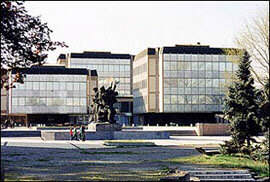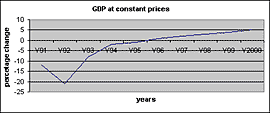 RELATIONS WITH INTERNATIONAL ORGANIZATIONS RELATIONS WITH INTERNATIONAL ORGANIZATIONS |
 INTERNATIONAL MONETARY FUND INTERNATIONAL MONETARY FUND |

On November 2000, the International Monetary Fund's (IMF) Executive Board has given its final approval to the three-year loan under the Poverty Reduction and Growth Facility (PRGF) under which the Republic of Macedonia received a US $ 13 milion financial assistance.
The final decision by the IMF Executive Board was contingent on a decision by the World Bank Executive Board on December 14, 2001 which concluded that the interim Poverty Reduction and Strategy Paper (PRSP) provides a sound basis for development of a fully participatory PRSP and for concessional assistance by the World Bank.
Under the Macedonia's three-year PRGF arrangement, the IMF Executive Board decision made immediately available about US$2 million.
 Talks on the budget Talks on the budget |
The International Monetary Fund technical mission negotiated with the Macedonian Governmental team the Budget's parameters for next year. Chief of the IMF Mission for Macedonia is Bishvajit Banerjee.

The IMF stance will be based on balanced Budget with minor deficit of one percent of the Gross Domestic Product. It is very likely the IMF to alloy, as of next year reducing of the personal tax, as well as of the custom taxes and some paragraphs from the VAT, above all of the medicines and agricultural products. Upon the initiative of the Macedonian negotiators, the participants at the talks will raise the question of reduction of the excise for vehicles and oil products, although the IMF generally stands that all the transition countries have no need for interventions of this nature.
In regard to the exchange course of denar, the IMF considers that there is no need for interventions, while there is a projected inflation rate of 2 percent for year 2001, which may vary in the course of the year.

The Fund considers that the Government must continue to pursue the reforms in the public administration, banking sector and especially in the sector of the enterprises. The PSAL arrangement, adopted in 2000, was projected for the reforms in the public administration, while boosting of the salaries is possible only by reducing the number of civil servants. The IMF considers that the current number of 22 banks is too big for Macedonia, while in regard to the loss-making companies, it recommends priority to be given to the primal debtors.
By the end of the fiscal year 2000 Macedonia marked a surplus in the budget for the first time in its history amounting to 5,1%.

| Regarding the plans for 2001 Governor of the National Bank Ljube Trpeski said: "In accordance with the IMF and World Bank arrangements in the coming years we are not planning to have surplus in the budget because of this rather high surplus in the budget we now have a chance to cut down some of the taxation rates, primarily with regard to the so-called personal tax." This will also contribute to the stability of the denar, he added.
"Maybe we are the No.1 country among the countries in transition, which has the most intensified relations with the IMF", Governor Ljube Trpeski stressed.

Macedonian Minister of Finance Nikola Gruevski says that as a result of some very good steps in Macedonia's economic policy in 2000, the country successfully made the following arrangements with the IMF and the World Bank: PRGF - EFF arrangement for poverty reduction; EFF arrangement for increased growth; FESAL arrangements for enterprises and banking reforms, and the Ministry currently works on reforms in the state administration - FESAL. Key condition for granting of the FESAL 2 arrangement to Macedonia are the reforms in the state administration, i.e. Macedonia has to decrease the number of employees in the state administration by 3.500. However, Gruevski says "I am optimistic that we will implement reforms in the state administration successfully".
 External Trade level External Trade level |
see table
 Composition of GDP Composition of GDP |
| Activity | Percentage
of Total | Industry and Mining
| 21.1 | | Agriculture and fishers | 7.8 | | Forestry | 0.5 | | Water management | 0.3 | | Construction | 5.9 | | Transports and Communications | 7.5 | | Trade | 14.0 | | Catering services and tourism | 2.0 | | Crafts and personal services | 2.0 | | Utilities and public services, landscaping and maintenance | 2.2 | Financial, technical, business and insurance services
| 5.6 | | Education, culture, science and information | 5.2 | Health care and social welfare
| 4.5 | | State and local administration bodies, political parties, public organizations and associations | 5.7 | | Imputed rents | 3.7 | | Minus imputed banking services | 2.7 | | GDP in basic prices | 85.4 | | Net-indirect taxes | 14.6 | | GDP in market prices | 100.0 |
Source: Office of Statistics, Jan 2001 |

